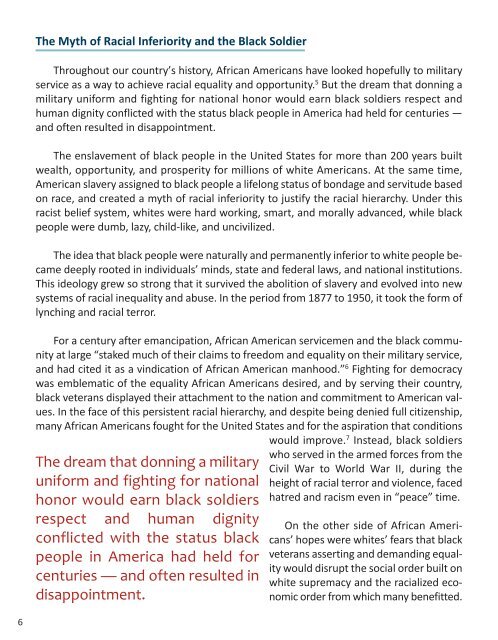You also want an ePaper? Increase the reach of your titles
YUMPU automatically turns print PDFs into web optimized ePapers that Google loves.
The Myth of Racial Inferiority and the Black Soldier<br />
Throughout our country’s history, African <strong>America</strong>ns have looked hopefully to military<br />
service as a way to achieve racial equality and opportunity. 5 But the dream that donn<strong>in</strong>g a<br />
military uniform and fight<strong>in</strong>g for national honor would earn black soldiers respect and<br />
human dignity conflicted with the status black people <strong>in</strong> <strong>America</strong> had held for centuries —<br />
and often resulted <strong>in</strong> disappo<strong>in</strong>tment.<br />
The enslavement of black people <strong>in</strong> the United States for more than 200 years built<br />
wealth, opportunity, and prosperity for millions of white <strong>America</strong>ns. At the same time,<br />
<strong>America</strong>n slavery assigned to black people a lifelong status of bondage and servitude based<br />
on race, and created a myth of racial <strong>in</strong>feriority to justify the racial hierarchy. Under this<br />
racist belief system, whites were hard work<strong>in</strong>g, smart, and morally advanced, while black<br />
people were dumb, lazy, child-like, and uncivilized.<br />
The idea that black people were naturally and permanently <strong>in</strong>ferior to white people became<br />
deeply rooted <strong>in</strong> <strong>in</strong>dividuals’ m<strong>in</strong>ds, state and federal laws, and national <strong>in</strong>stitutions.<br />
This ideology grew so strong that it survived the abolition of slavery and evolved <strong>in</strong>to new<br />
systems of racial <strong>in</strong>equality and abuse. In the period from 1877 to 1950, it took the form of<br />
lynch<strong>in</strong>g and racial terror.<br />
For a century after emancipation, African <strong>America</strong>n servicemen and the black community<br />
at large “staked much of their claims to freedom and equality on their military service,<br />
and had cited it as a v<strong>in</strong>dication of African <strong>America</strong>n manhood.” 6 Fight<strong>in</strong>g for democracy<br />
was emblematic of the equality African <strong>America</strong>ns desired, and by serv<strong>in</strong>g their country,<br />
black veterans displayed their attachment to the nation and commitment to <strong>America</strong>n values.<br />
In the face of this persistent racial hierarchy, and despite be<strong>in</strong>g denied full citizenship,<br />
many African <strong>America</strong>ns fought for the United States and for the aspiration that conditions<br />
would improve. 7 Instead, black soldiers<br />
The dream that donn<strong>in</strong>g a military<br />
uniform and fight<strong>in</strong>g for national<br />
honor would earn black soldiers<br />
respect and human dignity<br />
conflicted with the status black<br />
people <strong>in</strong> <strong>America</strong> had held for<br />
centuries — and often resulted <strong>in</strong><br />
disappo<strong>in</strong>tment.<br />
who served <strong>in</strong> the armed forces from the<br />
Civil War to World War II, dur<strong>in</strong>g the<br />
height of racial terror and violence, faced<br />
hatred and racism even <strong>in</strong> “peace” time.<br />
On the other side of African <strong>America</strong>ns’<br />
hopes were whites’ fears that black<br />
veterans assert<strong>in</strong>g and demand<strong>in</strong>g equality<br />
would disrupt the social order built on<br />
white supremacy and the racialized economic<br />
order from which many benefitted.<br />
6


